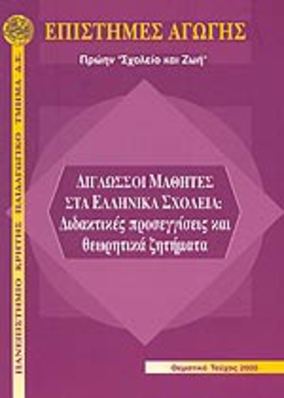Φάκελος υλικού του εκπαιδευτικού (teacher portfolio) και επαγγελματική ανάπτυξη : προοπτικές και προεκτάσεις εφαρμογής μιας εναλλακτικής αξιολόγησης
Part of : Επιστήμες Αγωγής ; No.4, 2012, pages 21-40
Issue:
Pages:
21-40
Author:
Abstract:
L΄objectif de cette contribution sera d’analyser les conditions d’une éventuelle implantation du portfolio en tant qu’instrument d’évaluation des enseignants dans le cadre centralisé du système éducatif grec. Ce sera l’occasion d’éclaircir, en s’appuyant sur la bibliographie relative, le rôle du portfolio des enseignants et les perspectives d’une telle application. Le portfolio a pour objectif de permettre à l’enseignant de réfléchir sur sa pratique professionnelle, d’évaluer l’efficacité d’un cours et de contribuer à une meilleure connaissance de soi. Une évaluation fondée sur les compétences à atteindre, plutôt que sur le résultat brut, pourrait modifier les pratiques pédagogiques et inciter les acteurs du système éducatif grec à introduire et à accepter plus largement cet outil.
Subject:
Subject (LC):
Keywords:
φάκελος υλικού εκπαιδευτικού, αξιολόγηση βάσει φακέλου, επαγγελματική ανάπτυξη, αυτοαξιολόγηση
Notes:
Περιέχει σημειώσεις και βιβλιογραφία
References (1):
- ΒιβλιογραφίαAndrejko, L. (1998) The case of the teacher portfolio, in: Journal in staff development,19 1-12.Barrett, H. (2000) Electronic teaching portfolios: multimedia skills & portfolio develop-ment=powerfulprofessional development. Available online at: transition.alaska.edu/www/portfolios/site2000.htlm. (accessed 23 February 2008).Barrett, H. (2005) Le processus de développement du portfolio électronique, in StudiesHigher Education, 26: 27-29.Barton, )., A. Collins (1993) Portfolios in teacher education. Journal of Teacher Education,400: 200-210.Baume, D., C. Baume (1996) A national scheme to develop and accredit university teachers, International Journal for Academic development, 1 (2): 51-58.Beck,J. (1999) Makeover or takeover? The strange death of educational autonomy. In:Neo-liberal England British Journal of Sociology of Education, voi. 20, n° 2.Beck,R.,L.Linve,S.Bear(2005) Teachers' self-assessment of the effects of formativeand summative electronic portfolios on professional development, in: EuropeanJournal of Teacher Education, 3: 221-244.Brown, J.O. (2001 ) The portfolio: a reflective bridge connecting the learner, higher education and the workplace. The Journal of Continuing Higher Education, 49 (2): 1 -13.Campbell, D.M., P.B. Cignetti, B.J. Melenyser, D.H. Nettles, R.M. Wyman (2000) Portfolio and performance assessment in teacher education. MA: Allyn & Bacon, Needham Heights.Chitpin, S., C.W. Evers (2005) Teacher professional development as knowledge building:A Popperian analysis, in, Teachers and Teaching: Theory & Practice, 11: 419-433.Darling, L.F. (2001) Portfolio as practice: the narrative of emerging teachers. Teachingand Teacher Education, 17: 107-121.Darling-Hammond, L. (1990a) Teacher evaluation in transition: Emerging roles and evolving methods. In: The new handbook of teacher evaluation. California: Corwin Press,17-32.Darling-Hammond, L. (1990 b) Teacher professionalism: why and how. In Lieberman, A.(Ed.).Schools as collaborative cultures: creating the future now. London: FalmerPress,25-50.Day, C. (1999) Developing teachers: The challenges of lifelong learning (pp.28-31 ). London: Falmer Press.Decker, C.A., J.R. Decker (2001 ) Planning and administering early childhood programs.Upper Saddle River, NJ: Prentice Hall.Deveci, H., F. Ersoy, A. Ersoy (2006) The views or prospective elementary school teachers on the use of portfolio assessment in teacher education. Educational Sciences:Theory and Practice, 6, 193-199.Dootlittle, P. (1994) Teacher portfolio assessment, in Practical Assessment, Research &Evaluation, 4: 1-10.Driessen, E., D. Vleuten, L. Schuwirth, J. Tartwijk, J. Vermunt (2005) The use of qualitative research criteria for portfolio assessment as an alternative to reliability evaluation: a case study, in Medical Education, 39: 214-220.Duke, D., R. Stiggins (1990) Beyond minimum competence: evaluation for professionaldevelopment, in: The new handbook of teacher evaluation, California: CorwinPress.Dysthe, Ο., K.N. Engelsen (2004) Portfolios and assessment in teacher education in Norway: a theory-based discussion of different models in two sites. Asses smen t & Education in Higher Education, 29 (2): 239-258).Fetterman, D. M. (1994) Empowerment evaluation. Evaluation Practice, 13: 1-15.Fontana, D., M. Fernandes (1994) Improvements in mathematics performance as a consequence of self-assessment in Portuguese primary school pupils. British JournalofEducational Psychology, 64: 407-417.Frederiksen, J.R., B.J. White (1997) Reflective assessment of students' research within aninquiry-based middle school science curriculum. Paper presented at the annualmeeting of the American Educational Research Association, Chicago.Geifer, J.I., Y. Xu, P.G. Perkins (2004) Developing portfolios to evaluate teacher performance in early childhood education. Early Childhood Education Journal, 32:127-132.Klecker, B. M. (2000) Content validity of preservice teacher portfolio in a standards-based program. Journal of Instruction Psychology, 27: 35-38.Lyons, N. (1998) With portfolio in hand: validating the new teacher professionalism. NewYork, NY: Teachers College Press.Lyons, N. (1999) Flow portfolios can shape emerging practice. Educational Leadership,56 (8): 63-65.Murphy, P., D. Chetcuti, G. Grima (2006) The formative and summative uses of a professional development portfolio: A Maltese case study, Assessment in Education,13 (1): 97-112.Ritsarson, V., S. Kile (1992) The use of videocase in teacher education, Paper presentedat the meeting of the American Educational Research Association, San Francisco.Salzman, S. A., P.R. Denner, L.B. Harris (2002) Teacher education outcome measures:Special study survey. Washington: American Association of Colleges of Teacher Education.Scriven, M. (1996) Types of evaluator and types of evaluation. Evaluation Practice, 17:367-382.Shadish, W.R. (1994) Need-based evaluation theory: What do you need to know to dogood evaluation. Evaluation Practice, 15: 347-358.taff and Educational Development Association (2000) The SEDA teacher accreditationScheme, Birmingham, SEDA, available at: http://www.seda.demon.co.ok/taccred.htmlWilkerson, J.R., W.S. Lang (2003) Portfolios, the Pied Piper of teacher certification assessment: legal and psychometric issues. Education Policy Analysis Archives, 11(45): 1-31.Windsor, P.J.T., R.L. Butt, H. Reeves (1999) Portraying professional development in preservice teacher education: Can portfolios do the job? Teachers and Teaching: Theoryand Practice, 5(1 ): 9-31.Wolf, D., et al. (1989) Portfolio assessment: Sampling Student Work, in EducationalLeadership, 46: 35-39.Wolf, D, et al. (1997) The schoolteacher's portfolio: Issues in design, implementationand evaluation, in Phi Delta Kappan, 73: 129-136.Worthern, B.R., J.R. Sanders, J.L. Fitzpatrick (2000) Program evaluation: Alternative approaches and practical guidelines (3rd ed.). White Plains, NY: Addison Wesley Longman.Zeichner, K., S. Wray (2001) The teaching portfolio in US teacher education programs:What we know and what we need to know. Teaching and Teacher Education, 17:613-62




